Molineux: Wolverhampton Wanderers
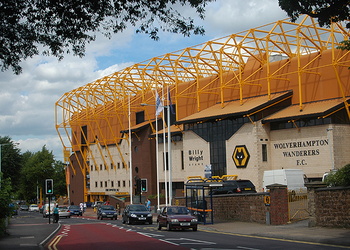
Row17 [CC BY-SA 2.0], via Wikimedia Commons
Despite having a name that sounds a little like a type of painkiller, Molineux is full of history and also boasts a number of fun claims to fame. It has been the home of Wolverhampton Wanderers since 1889 and was also the club’s first permanent football ground. Previously they’d basically played on a field and a makeshift location on Dudley Road. Molineux was the first ‘new build’ stadium in the Football League and was also one of the first grounds to install floodlights, allowing games to be played after it had gone dark out.
Molineux also played host to one of the first European club games, which it did in the 1950s. When it was renovated in the early 1990s the stadium was considered to be one of the most modern and state-of-the-art grounds in England, though it is obviously showing its age now compared to more recently developed grounds.
Stats
| Molineux Stats | |
|---|---|
| Year Opened | 1889 |
| Capacity | 31750 |
| Average Attendance | 31307 |
| Record Attendance | 61315 (Wolves v Liverpool (1939)) |
| Pitch Size | 100 x 64 (6400) |
| Owner | Wolverhampton Wanderers |
| Clubs Hosted | Wolverhampton Wanderers F.C. |
| First Fixture | Wolverhampton Wanderers v Notts County (07/09/1889) |
| Wolverhampton Wanderers Stats | |
|---|---|
| Year Founded | 1877 |
| Nickname | Wolves, The Wanderers |
| Club Mascot | Wolfie and Wendy |
| Rivals | West Bromwich Albion, Aston Villa, Birmingham City, Walsall, Stoke City |
| Previous Stadiums | Goldthorn Hill, John Harper's Field, Dudley Road, |
| Kit | Gold & Black (Home) / Red (Away) / Grey (Third) |
| Training Ground | Sir Jack Hayward Training Ground |
| Shirt Sponsor | DeBet |
| Team Owner | Fosun International |
| Record Goalscorer | Steve Bull (306) |
| Record Appearances | Derek Parkin (609) |
Molineux Photos
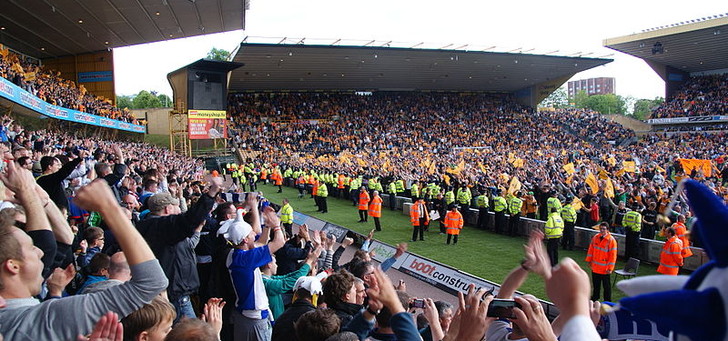
Bill Boaden [CC BY-SA 2.0]
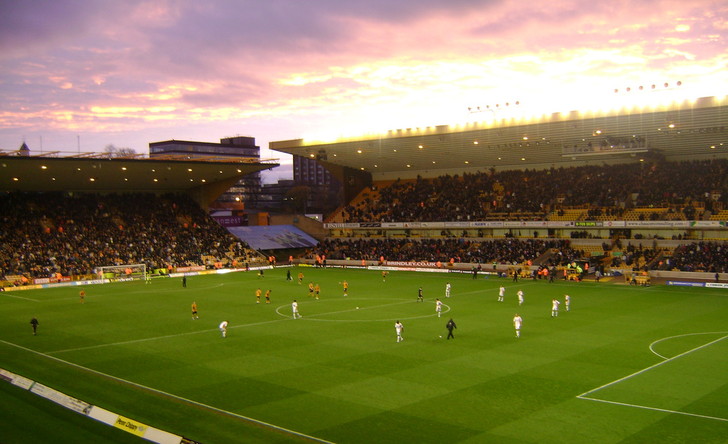
Tony Evans / Flikr.com
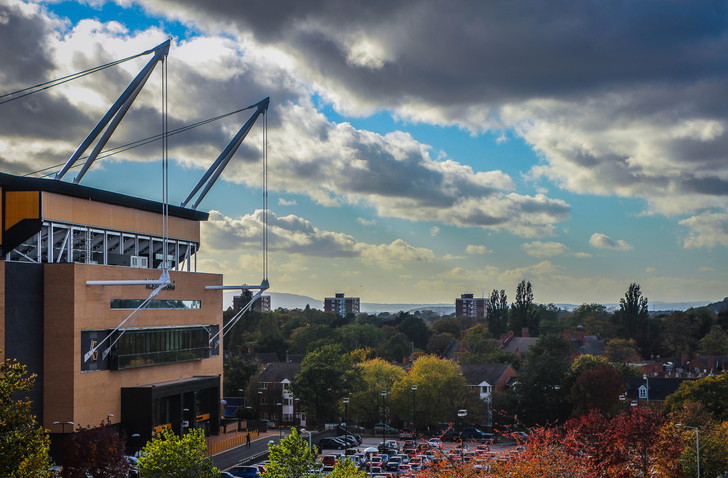
Adam Hinett / Flikr.com
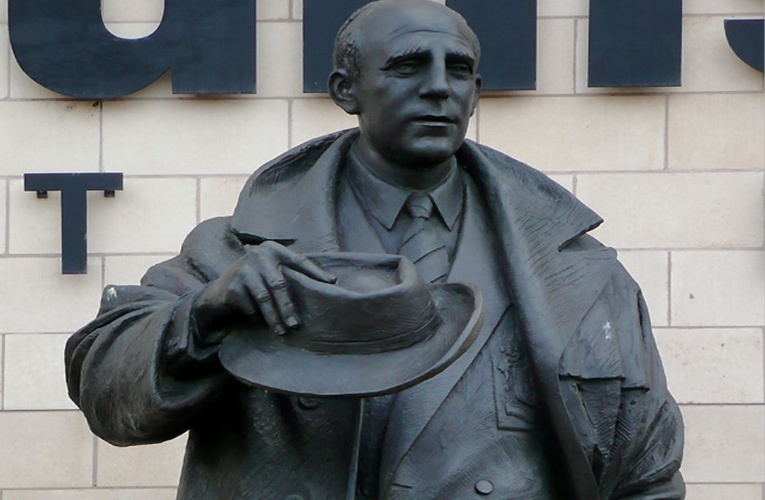
Credit: Roger D Kidd Geograph
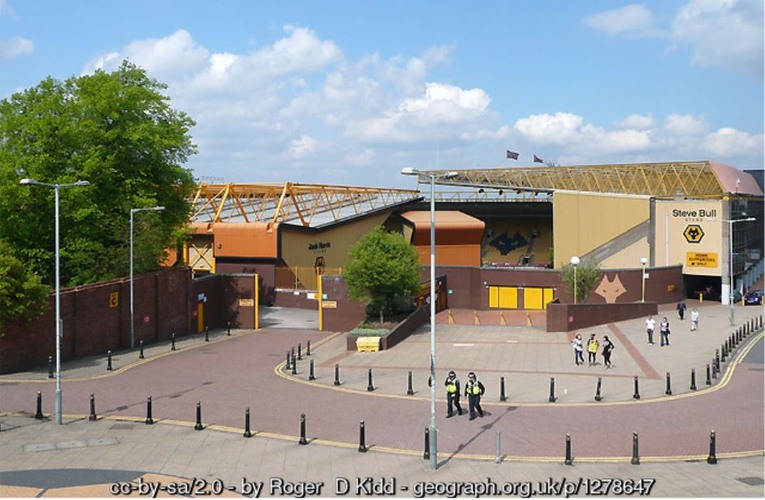
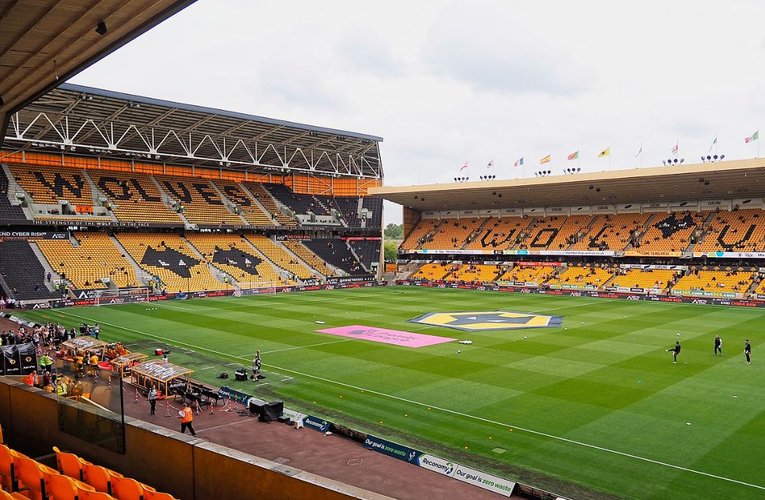
Molineux Seating Plan and Where to Sit
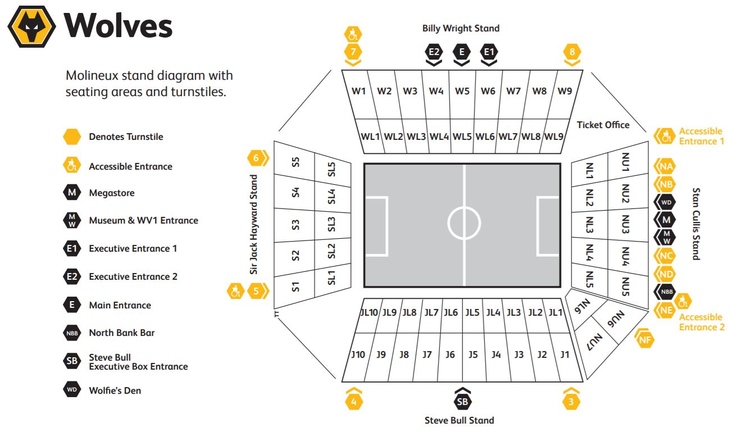
Molineaux is built in a ‘Bowl Style’ but still offers a nod to the more ‘English Style’ of its origins. There are four stands around each part of the pitch, with two tiers in all but one of them.
Here’s some info about each:
- The Stan Cullis Stand – This was the first stand to be re-built when the club decided to renovate the ground in 2010. It can house just under 8,000 supporters over its two tiers.
- The Steve Bull Stand – Renamed after the club’s record goal scorer in 2003, this stand was originally called The John Ireland Stand and runs along the side of the pitch.
- The Sir Jack Haywood Stand – A two-tiered stand that welcomes the most vocal of the Wolves support, the views from every seat are uninterrupted.
- The Billy Wright Stand – This is typically considered to be the main stand in the ground and houses the changing rooms, the tunnel and the dugouts.
Wolverhampton Wanderers Ticket Prices
Prices for Wolves matches aren’t too expensive, with matches split into just two different categories. The main things that will change how much you’ll pay are your age and where in the ground you’d like to sit. Prices range from £35 to £63.50 if you’re an adult or between £24.50 and £63.50 if you’re over sixty-five. There are further discounts for younger fans. There are also minimal admin fees unless you print your own ticket, adding £1.50 or £1.00 to your bill per ticket depending on how many you buy.
When it comes to season tickets, you’ll pay different amounts of money depending on whether you get them over the phone, on the internet or via Direct Debit. There is currently a waiting list though, so you might be lucky.
How To Get Wolverhampton Wanderers Tickets
The best way to get tickets for Wolves matches is via the club’s official website. You can not only buy match tickets but you can also click on an interactive map of the ground that will let you know roughly what the view will be from your seat. You won’t get that over the phone, though you can, of course, buy tickets that way if you’d prefer. You can also pick up tickets from the club’s box office at the ground itself.
Supporters are able to buy tickets in advance depending on how many loyalty points they have. For busy games, those with enough points are able to buy tickets 2 weeks before they go on general sale.
Where to Buy
Getting To Molineux
The Midlands isn’t named that because it sounds funny when someone with a Black Country accent says it, but rather because that’s what it is – in the middle of the land. It’s therefore easy enough to get to Wolverhampton from pretty much anywhere in the country.
Here’s some of the more typical routes you might consider:
Train – Molineaux is little more than a short walk from Wolverhampton Railway Station, so get there and you’ve done most of the journey without having to get off your bottom. There are direct trains there from Birmingham New Street, London Euston and Liverpool Lime Street, to name but three possible starting locations.
Bus – There are at least eight different bus routes that serve Molineaux from the city centre and surrounding regions. Bus number 3, 4, 5, 5A, 62, 62A, 877 and 878 should all get you to where you want to go.
Car – From the North exit the M6 at Junction 12 then take the A5 then the A449 and follow the signs. From the South leave the M5 at Junction 2 and get onto the A4123 before following the signs for the ground. From the South-East leave the M6 at Junction 10 and take the A54 then the A449 until you see the stadium.
By Air – Birmingham International Airport is the one you’ll be heading towards if you’re flying in especially to see Wolves play. It’s about thirty miles away and there are direct trains to Wolverhampton that take about thirty minutes.
Taxi – A train from Wolverhampton Railway Station to the ground will probably take you longer than walking because of the city’s traffic routes, but if you’re interested to know then it will take you just over 5 minutes and cost about £8. Needless to say if you get stuck in traffic you’ll pay more.
Parking Near Molineux
There are a whole host of official car parks near to the ground that offer free match day parking. You can book a parking pass through the ticket office and they’ll assign you a space in one of four locations; Birch Street, Redhill Street, Camp Street and Whitmore Hill are the ones that the club uses. There are on-street parking restrictions around the ground, but with four free car parks at your disposal why would you want to park on the street anyway?
Useful Resources
- Parking - Just Park
Molineux Hotels
Wolverhampton is an enjoyable city to spend time in in its own right, but you’ve also got Birmingham nearby should you prefer the bright lights of a big city. Here are some hotels you might want to consider for your visit to Molineaux.

Redwings Lodge WOlverhampton - £77+

Novotel Wolverhampton - £50+
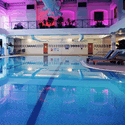
Village Hotel Walsall - £70+
Pubs and Bars Near Molineux
Wolverhampton is a city full of the charms of its Midlands location. Here are some of our favourite pre-match watering holes:
The Hogshead
The George Wallis
The Great Western
Facilities
The fact that Molineaux is almost constantly being updated and upgraded is a good thing as far as the ground’s facilities are concerned. The seats are reasonably comfortable, the views are almost universally unobstructed and the concourses are wide and welcoming. You’ll be faced with numerous places to buy a bite to eat or a refreshing drink before and during the match.
Prices
- Programme: £4
- Pie: £3.6
- Cup of tea: £2.2
- Beer: £4
Hospitality
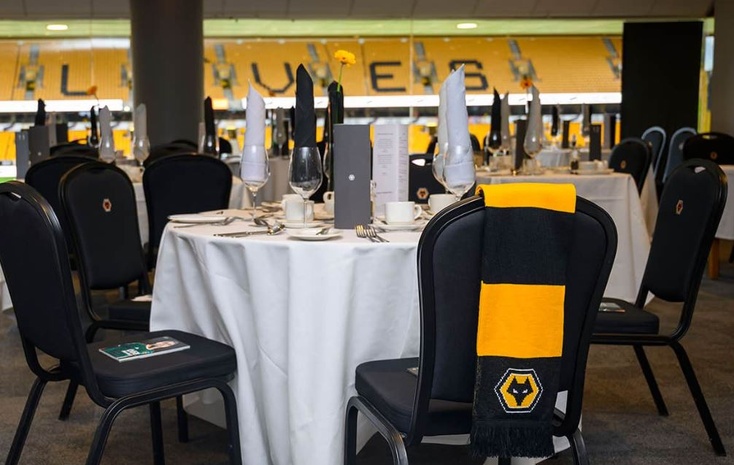
Molineaux is a stadium in a state of constant flux in order to ensure it keeps up with the times. As such there are a host of ever-evolving match day hospitality packages for your enjoyment. Here’s some details on a couple of your choices:
- The WV1 Restaurant – You’ll enjoy a three-course meal on a private table that faces the pitch here, before heading to your padded seat in The Stan Cullis Stand. A pay bar is also available and you’ll receive half-time and full-time refreshments, too.
- WV1 Quadrant – Big enough for up to 34 people and pitch facing, you will all get a complimentary drink, food, a private balcony with seating, matchday program and access to a bottle bar.
- WV1+ – With prime padded seats in the Stan Cullis lower, car parking, a three course grazing menu, inclusive drinks and matchday programme, WV1+ offers an exquisite match day experience in a contemporary setting.
- The International – For something relaxed but special, the International is just the ticket. Padded seats right next to the director’s box, a four course self service menu, car parking, match day programme, and welcome drink reception awaits.
- Billy’s Boot Room – A more intimate experience here, with a welcome drink and either a 2 or 3 course meal depending on the package you choose. You also get half time refreshments, access to a cash bar, and seats in a prime location in the Billy Wright Upper stand.
- Steve Bull Boxes – A little more low key perhaps, but also more private. Each enclosed box can host up to 8 people and includes a pre match buffet, half time refreshments, and full waitress service. The views from these boxes are great.
Private Hire
There are no less than twelve suites and rooms available for private hire at Molineaux, not including the executive boxes. You can even hire the museum as an event space. The likelihood is slim, therefore, that you’ll want to put on an event that the gang at the home of Wolverhampton Wanderers won’t be able to cope with. Whether you want to host a Christening, an exhibition or even a wedding, this could be the perfect venue for your private hire needs.
Stadium Tours & Museum
Departing on Fridays, Saturdays, and Sundays between 11am and 3pm, the 90 minute tour of Molineaux stadium will see fans take in all of the sights you’d expect from a visit to one of the West Midlands’ most up-to-date stadiums. You’ll get a chance to wander around both dressing rooms, walk down the tunnel to the side of the pitch and take a moment to sit in the manager’s dug-out and imagine what it would be like to prepare your team for the challenge ahead.
Tour tickets cost £22 for everyone. VIP tours are pricier at £40, but you get to meet and be guided by a Wolves legend.
Included in the cost of the ticket is a visit to Molineaux’s new museum dedicated to the history of Wolverhampton Wanderers; a must-see for any big Wolves fan or those hoping to learn about the club’s illustrious past. You need to book in advance for the tour, so get in touch with the club before you head along. If you just want to do the museum, which is open on match days, then it’s £10 for adults and £5 for minors.
About Wolverhampton Wanderers

Founded as St. Luke’s Football Club in 1877, though there was no proof that Saint Luke ever played for them, Wolverhampton Wanderers are better known to football fans simply as Wolves. They were not only one of the founding members of the Football League but also helped to establish the European Cup, the competition that was later to be rebranded as the Champions League. This led to Wolves being declared to be ‘The Champions of the World’ by some sections of the English press thanks to their victories against the top teams in England and the rest of Europe.
Despite the club failing to relive their former glories in recent times they do have an illustrious history. They have won the country’s top division three times, most recently in 1959, and also finished runners-up five times. They have won the second-tier of English football three times, too, with their most recent win coming in 2009. They narrowly missed out on a UEFA Cup win in 1972 and have four FA Cups to their name, to say nothing of their two League Cup wins.
Molineux History
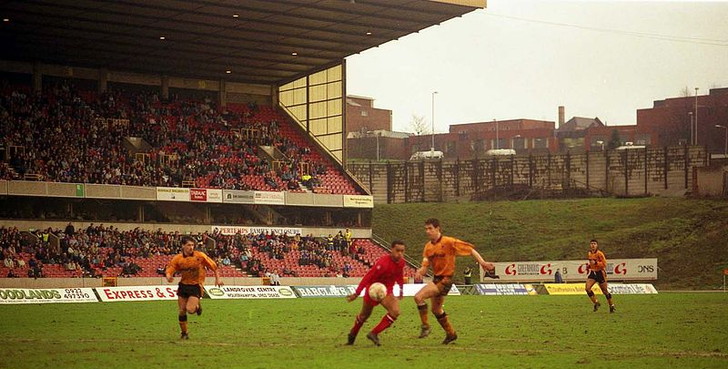
The ground’s strange name was taken from Benjamin Molineaux, a local merchant to the city who purchased the land on which the stadium now stands. He originally built himself a home that he somewhat arrogantly called Molineaux House, which was later turned into Molineaux Hotel. In 1860 the land was purchased by O. E. McGregor and he turned it into a pleasure park, complete with ice rink, cycling track and a boating lake. Crucially it also featured a football pitch, and it was this that Wolverhampton Wanderers leased from Northampton Brewery after the company bought the land in 1889.
The ground as it is presently known came into existence during the 1990s. It followed the takeover of the club by Sir Jack Hayward, the man after whom one of the stands is now named. He saw the requirement to redevelop the stadium in the wake of the Hillsborough disaster as an opportunity to bring the club’s ground right up-to-date, demolishing and re-building the stands one at a time throughout the early part of the decade. The new stadium was opened officially in December of 1993 when Wolves played a friendly again the Hungarian side Budapest Honvéd FC.
Future Developments
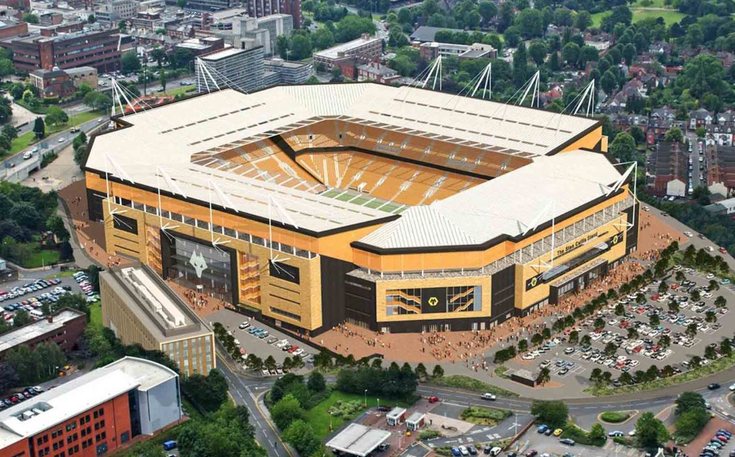
Plans to renovate the stadium were announced in 2010, with The Stan Cullis Stand the first to undergo developments. Work was planned in 4 phases and some of these were completed, but it was held up due to the club’s then owner, Steve Morgan, deciding to put it up for sale. Fosun International took over and plans seemed to be developing apace. Images of what the stadium could look like were released at the end of the 19/20 season and a new capacity of 50,000 was set as the ultimate target, achieved by joining all of the stands together and creating more of a ‘bowl’ effect than they currently have.
However, the 2020 pandemic put the brakes on yet again, and funds are being prioritised to strengthen the team ahead of continuing with phase 3 of the development, which would be to build new top-tier on the Sir Jack Hayward Stand which would connect to the Steve Bull stand.
This would bring capacity up to 38,000 which is badly needed as the stadium regularly sells out, but to get to the 50,000 target phase 4 would also need to be completed. This would see the Billy Wright stand completely redeveloped. It’s on the backburner for now though, will all funds going to strengthening the squad.
